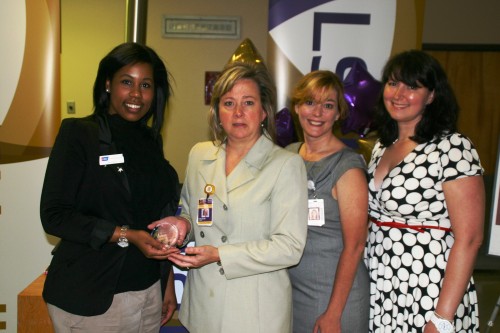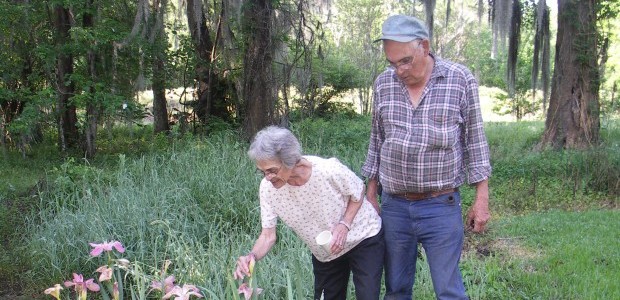
Chabert handed service award
April 11, 2012
Refrigeration co. has solid southern market
April 11, 2012Bois d’Arc Gardens is part commercial venture, part research center, part educational setting, part reflective retreat, part wildlife refuge and, oh yes, home to Dr. Bernard “Bud” and Russella “Rusty” McSparrin.
Turn off the paved Bull Run Road in Chacahoula at the mailbox marked 1831, and follow a winding vehicle-track drive through trees to enter a 40 acre wooded area of ponds framed by live oak and swamp adorned with cypress and Spanish moss.
Wild mallards, family dogs, vegetables growing in various patches and a raised two-level cabin project the rustic setting as a combined working farm and pastoral retreat.
It is a place where the proprietors are keenly connected to one another, the land, the product and their purpose.
Bud and Rusty, as their friends and professional acquaintances know them, said they have known one another since 1963 through memberships in the Society for Louisiana Irises and other gardening organizations.
Rusty and her previous husband, Dr. Edward Ostheimer purchased the property near Chacahoula 1982 and opened Bois d’Arc Gardens.
“When I lost Ed to a tragic accident in 2002, Bud talked me through a lot of it … and said, ‘I’m going to come help you.’”
Bud, who had previously lost his wife, helped Rusty revitalize the property that had become overgrown since “Dr. Ed’s” death and organized it into an economic and educational venture.
The iris lovers, educators and scientists soon realized they had a unique friendship as well as partnership, and within two years decided to commit themselves to a lasting relationship. “We were married in December 2004,” Rusty said.
As research growers, Bud and Rusty hybridized between them more than 700 different cultivars. Many of the best known Louisiana Iris varieties were created at Bois d’Arc Gardens. All their original growths are registered with the American Iris Society.
Creations produced by the duo, all of which are named after people they know or traits of the region where they live, include “Dr. Ed” in honor of Ostheimer, “Rusty-O” that Bud developed and named after Rusty, the “Chacahoula Cha-Cha,” and a unique purple and gold iris called Bayou Tiger. “That one is real popular in Baton Rouge,” Bud said as he filled and lit his pipe. “I wonder why?”
As a business venture, Bud and Rusty, with occasional part-time help, grow for a wholesale market that spreads across the United States and has reached from Europe to Japan.
The McSparrins keep their property open for visitors and will sell bulk bulb sections to individuals or by way of their website www.bois-darc.com. Iris plants range in price from $7 to $35 individually.
“I won’t sell people anything that I don’t feel will grow for them,” Rusty said. “If it is not a good grower [under certain conditions] and you still want it, I warned you.”
Much of this business is supported by corporate contracts, landscaping companies and commercial nurseries locally and out of major cities including Houston.
Sharing their love for the Louisiana Iris and its hundreds of varieties is not limited to commercial ventures. Bud and Rusty donated 30,000 plants to the New Orleans City Park restoration following Hurricane Katrina, more than 6,000 to the Louisiana State Arboretum, and 2,000 to LSU Alexandria for research. They also travel to trade shows and play host to multiple gardening organizations.
As a group of wild mallards waddle their way along one of the property ponds, Bud pointed out that Bois d’Arc Gardens is also a National Wildlife Habitat and Bird Scantuary.
“We welcome anyone and anything except coyotes, armadillos and alligators,” Bud said. Nine alligators had to be removed from the McSparrin’s yard last summer.
Remaining true to their combined 60-plus years teaching experience, Bud and Rusty open their iris fields to an average 25 Nicholls State University students to work and learn every year.
“We have undergraduates that have gone and worked on the farm, as part of their service learning,” Nicholls State University associate biology professor Allyse Farrara said. “We have graduate students that go into internships with Bud and Rusty, particularly students who have an interest in plants and plant cultivation.”
Working in this field is not simply a matter of love for the iris, according to Farrara, Bud and Rusty. The joint educational effort includes enhanced conservation by use of the native Louisiana Iris, participating in marsh plantings, and using the hearty iris variety to strengthen ground on flood water basins and levee walls.
“We love Bud and Rusty and we love their property,” Farrara said. “Working with them is such a great experience for students learning the business aspects, like how you ship irises, and the regulations you have to adhere to. It just opens a whole other area to them.”
The Louisiana Iris is one of the most popular varieties of irises in the world. Early French explorers to the region called it “les glis de marais” or “glads of the marsh.”
With a broad color range, the plant native to Louisiana can today be found growing in gardens around the world.
Bud and Rusty said iris varieties have subtle markings as well as size, color and budding details that can offer a seemingly endless selection of flowers that make two blooms appear nearly identical to the unskilled eye, an adventure in discovery to the trained hybridizer.
Whether talking about the light chocolate, pink and lavender tones on the “Bayou Bandit” bloom; self-triangular flowers with white patches on a “Pink Joy Roberts;” or the branching fulva-greyed orange bloom called “Lockport,” Bud and Rusty realize there is more to knowing and appreciating plant life than simple visual appeal
For lovers of the Louisiana Iris, commerce, conservation and plant cross-breeding keeps it vital as a business and scientific venture.
“We need to all be good stewards of God’s gifts,” Rusty said. “That’s our purpose.”
Bud and Rusty McSparrin grow irises for their own enjoyment as well as commercial endeavors.











